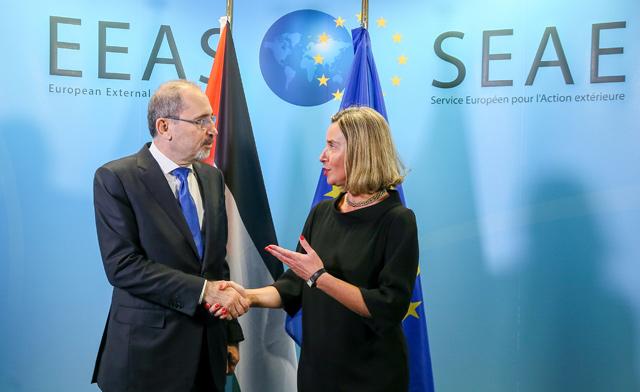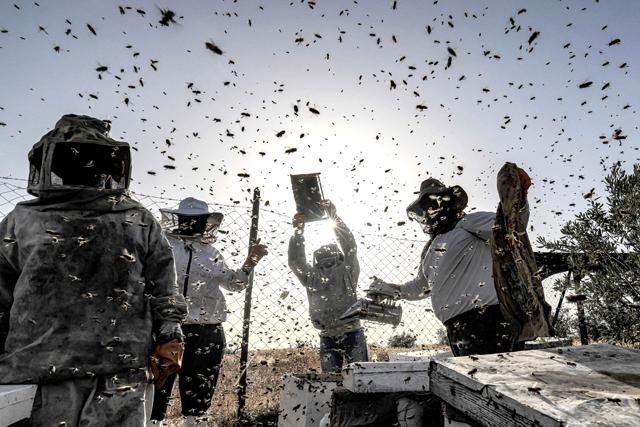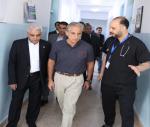You are here
Ageing Israel accords harm Palestinian economy — World Bank
By Agencies - Apr 18,2016 - Last updated at Apr 18,2016

In this July 23, 2015, photo, two Palestinian boys stand outside a tent (background) watching workers rebuild a house which was destroyed during the 2014 summer war between Israel and Hamas, as the long-awaited reconstruction began in Shijaiyah neighbourhood, eastern Gaza City (AP photo)
OCCUPIED JERUSALEM — The Palestinian economy is losing hundreds of millions of dollars every year over outdated or insufficiently enforced fiscal agreements with Israel, a World Bank report said on Monday.
The lost revenue of $285 million annually was equivalent to 2.2 per cent of Palestinian gross domestic product (GDP), according to the report prepared ahead of the bi-annual meeting of the Ad Hoc Liaison Committee (AHLC) which coordinates international donor support for the Palestinians.
The Ramallah-based Palestinian Authority (PA) "suffers from substantial revenue losses under the current revenue sharing arrangements outlined by the Paris Protocol", the report said of the 1994 agreement which governs economic ties between Israel and the Palestinian territories.
It added that most of the losses are a result of "tax leakages on bilateral trade with Israel, in addition to undervaluation of Palestinian imports from third countries".
The World Bank also noted the handling fees Israel takes for imports en route to the Palestinians, which at the current rate of three per cent "significantly outstrips costs incurred by [Israel] to handle Palestinian imports", recommending that the rate be reduced to 0.6 per cent.
The World Bank said it could not quantify the losses to the PA because of a lack of access to Israeli data.
The Palestinian Authority has also so far failed to open a "dedicated fund" to receive $669 million in pension payments collected by the Israeli government for Palestinians working in Israel.
The World Bank noted recent meetings between Israeli and Palestinian finance ministers over the issues, and Israel's commitment to transfer $128 million to "offset some of the PA's losses", calling it "highly encouraging as a first step".
"Reviving the Israeli-Palestinian Joint Economic Committee, originally set to monitor implementation of the Paris Protocol and resolve outstanding issues, could significantly enhance economic and fiscal cooperation between the parties," it said in a statement.
Resolving outstanding financial "issues" between Israel and the Palestinians could not only "ease the PA's fiscal stress" and improve its economy but might even "facilitate progress on the political front", the report added.
The Israeli finance ministry said that it ensures that the Paris accords are implemented and has made reductions in its handling fees totalling around $21 million.
"We regret that the World Bank report gave an exaggerated and one-sided analysis of damage to the PA's revenues," it wrote in a response to AFP's query.
"The ministry of finance continues to maintain a positive dialogue with the Palestinian Authority intended for the benefit of both sides," it said.
Earlier this month, Israeli and Palestinian officials agreed to end several days of rolling blackouts in the occupied West Bank over what Israel says is some $450 million in arrears for electricity supplied by Israel.
The World Bank report was set to be presented to the AHLC on Tuesday in Brussels.
Separately, a new report released Monday by the World Bank shows that Qatar, the United Arab Emirates and other Arab donors have delivered only a small fraction of what was promised after Arab countries led the way in pledging reconstruction aid to Gaza, the seaside enclave devastated following Israel's war against militants in 2014.
The World Bank's report sends a stark message that donations are well behind the schedule set when pledges were made at an international conference in October 2014.
"Actual disbursements fall short of planned disbursements by around $1.3 billion, and hence, donors are urged to accelerate the disbursement of funds," the report said.
If donor funding continues at the current pace, it added, pledges are expected to be complete by mid-2019, some two years behind schedule.
The fighting inflicted heavy damage on Gaza, damaging or destroying some 171,000 homes, according to UN figures. The Palestinians say 75,000 people remain homeless. Israel says Hamas is responsible for the damage, noting the group used residential neighbourhoods for cover as it fired rockets, triggering Israeli retaliation.
At the 2014 conference in Cairo, the international community pledged some $3.51 billion in aid over three years to rebuild Gaza. According to Monday's report, as of the end of March, $1.41 billion has been delivered, compared to $2.71 billion that should have arrived by now.
Qatar led the list of donors in 2014, pledging $1 billion. The energy-rich country's foreign minister at the time, Khalid Bin Mohammed Al Attiyah, denounced the "international silence" that surrounded Gaza's destruction.
"While the Palestinian people need financial support, they need more political support from the international community," he said at the time.
Yet a year and half later, Qatar has delivered only $152 million, or 15 per cent of what was promised, according to the World Bank.
Saudi Arabia, the number 2 donor, has delivered just over 10 per cent of the $500 million it pledged, while the UAE has sent just 15 per cent of the $200 million it promised and Kuwait has delivered none of the $200 million it pledged.
Turkey, one of Hamas' closest allies, has delivered about one-third of the $200 million it pledged.
In Ankara, a Turkish foreign ministry official said that Turkish aid is expected to reach up to $250 million by the 2017 target date "and therefore to exceed the pledge that was made." The official spoke on condition of anonymity in line with government regulations.
Officials from the Gulf Arab countries were not immediately available for comment.
In contrast, the United States, the number 4 donor, has delivered all of the $277 million it pledged, while the European Union, the number 3 donor, has sent nearly three-quarters of the $348 million it promised, according to the figures.
Individual European nations, including Norway, Switzerland, Germany and the UK have all sent most or all of the aid they pledged.
The international aid is meant to pass through the internationally recognised PA, bypassing Hamas.
Last week, Palestinian Prime Minister Rami Hamdallah urged donor countries to "make good on their pledges."
For years, the Palestinians, who rely heavily on donor aid to prop up their self-rule government, have complained that Arab allies have been slow in delivering promised assistance.
Hamas spokesman Sami Abu Zuhri urged donors to fulfill their pledges, warning that ongoing harsh conditions in Gaza could lead to renewed violence.
"Unfortunately, there are broken promises and betrayal from the donor parties in the reconstruction file," he said. "We call on all parties to honor their pledges because the situation in Gaza is catastrophic."
Donor aid is just one component of rescuing the embattled Palestinian economy, and in its report, the World Bank also took aim at Israel.
It said that an Israeli blockade imposed on Gaza after Hamas seized power in 2007, "continues to weigh on the economy".
It also said that Egypt's closure of its border crossing with Gaza, the main gateway for people moving in and out of the territory, has "further exacerbated the situation".
Related Articles
BRUSSELS, Belgium — International donors raised $4.4 billion in emergency aid for Syria and its neighbours on Wednesday, but the total fell
RAMALLAH, Palestinian Territories — The World Bank on Monday urged donors to boost support for the Palestinian Authority (PA), which it said
The failure by world donors to deliver billions of dollars of aid to rebuild Gaza is jeopardizing efforts to avoid a new flareup in the Palestinian territory, a senior UN official warned Wednesday.


















